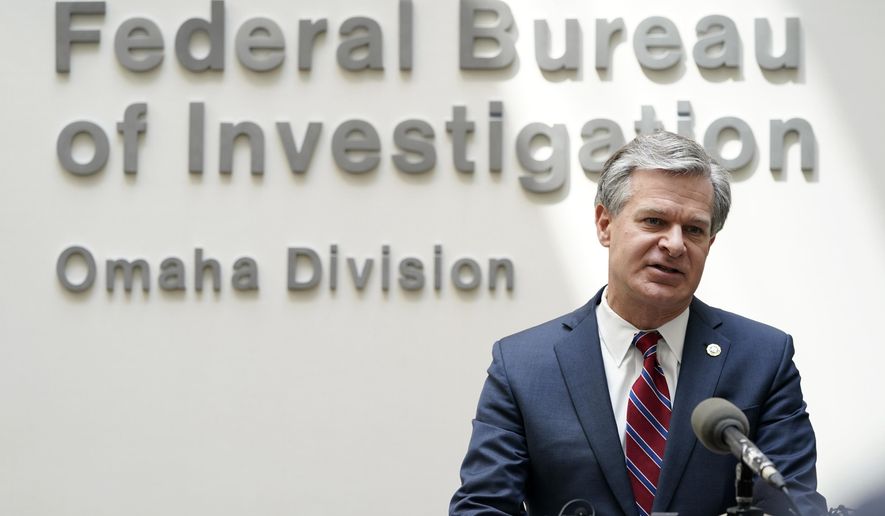The FBI revealed how the bureau uses the CIA and National Security Agency to probe the private lives of Americans without a warrant in its updated rulebook, which is the first version made public since the Obama administration.
The handbook, rewritten in 2021, confirms a decade-old leak showcasing the bureau’s collaboration with the CIA and NSA for FBI probes that may involve surveillance without court orders against people not accused of any crimes. Such probes are known as “assessments” at the FBI.
The revelations will fuel critics who have long accused the FBI of abusing its national security surveillance powers.
The FBI’s partnership with U.S. intelligence agencies that are focused on foreign threats is expected to get intense scrutiny from the new Republican-run Congress. The House Permanent Select Committee on Intelligence and House Judiciary Committee are digging into how intelligence agencies target Americans. Plans include a new panel to examine the weaponization of the federal government against U.S. citizens.
New information about the FBI’s work with other federal agencies and state and local officials is included in the 906-page rule book authored during the Trump administration and revised under President Biden. The bureau published the updated Domestic Investigations and Operations Guide online after rejecting requests to make it public.
The words CIA and NSA are unredacted in section 20.2 of the 2021 rule book, while the full details of the section remain hidden from public view. A leaked 2011 copy of the FBI’s rule book without redactions obtained by The Intercept shows that section 20.2 covers name trace requests, which involve formal FBI requests for other agencies to conduct searches of their records regarding subjects of interest.
SEE ALSO: New House committees to probe FBI abuse of power, fight China’s advance
Information obtained by CIA and NSA searches of their records may be used in assessments and predicated investigations, according to the leaked 2011 rule book.
The FBI assessments are investigations of people and groups that do not require accusations of wrongdoing and need only an “authorized purpose” and a clear objective, according to the 2021 rule book. The investigations are intended to prevent federal crimes, protect against threats to national security or collect foreign intelligence.
Cato Institute senior fellow Patrick Eddington said the updated rule book shows that the FBI is confident that it will not face consequences for its conduct.
“The bureau is continuing to hide the fact that 1) they can and clearly do use informants to penetrate domestic civil society organizations where those informants may, either on their own or at FBI direction, attempt to influence the organization’s actions,” Mr. Eddington said in an email. “And 2) [they] employ searches of CIA and NSA data streams on U.S. persons or civil society organizations absent a criminal predicate via assessments.”
Mr. Eddington said both practices should be prohibited by law and Congress will have a chance to do that this year.
The NSA declined to comment and referred questions to the FBI, which also refused to comment.
The CIA said it follows the rules and respects Americans’ privacy.
“CIA recognizes and takes very seriously our obligation to respect the privacy and civil liberties of U.S. persons in the conduct of our vital national security mission, and conducts our activities in compliance with U.S. law, Executive Order 12333, and our Attorney General guidelines,” the CIA said in a statement to The Times.
Assessments have faced bipartisan scrutiny in recent years, and the bureau’s internal audits dating to 2013 have shown agents’ repeated failures to follow rules for sensitive investigations.
The FBI’s use of assessments contributed to worries that agents are investigating Americans because of their ideologies, politics or religious beliefs. The conservative Concerned Women for America, a New York chapter of the League of Women Voters, and the Muslim Justice League in Massachusetts are among the groups swept up in FBI assessments, according to records obtained by Mr. Eddington.
The FBI revealed in 2021 that there was nothing to pursue at Concerned Women for America after conducting an assessment in 2016. In December 2021, the bureau told Sen. Chuck Grassley, Iowa Republican, that it did not need to explain its probe of the group.
The FBI’s use of assessments drew additional congressional attention from the House last year. Reps. Nancy Mace, South Carolina Republican, and Jamie Raskin, Maryland Democrat, pressed the Government Accountability Office to conduct a comprehensive review of the bureau’s assessments.
The bipartisan duo said the FBI may have wrongly used assessments to conduct investigations without factual predicates of criminal wrongdoing. They wanted to know whether the assessments involved the monitoring of constitutionally protected activity.
The bureau’s decision to unveil aspects of its work with the CIA and NSA in its 2021 rule book indicates that it has teamed with those intelligence agencies on assessments for more than 10 years.
The Cato Institute sued the FBI for access to government records and pressed the bureau to reveal its rule book before the FBI published it online this fall. Mr. Eddington said his team plans to file challenges to the information that the FBI is keeping hidden in its updated rule book.
• Ryan Lovelace can be reached at rlovelace@washingtontimes.com.




Please read our comment policy before commenting.